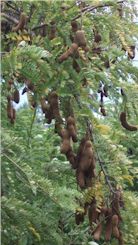|

Tamarind |
The Tamarind pod, though of foreign growth, has been much valued by our immediate ancestors as a household medicinal Simple; and a well stocked jar of its useful curative pulp was always found in the store cupboard of a prudent housewife. But of late years this serviceable fruit has fallen into the background of remedial resources, from which it may be now brought forward again with advantage. The natives of India have a prejudice against sleeping under the Tamarind; and the
acid damp from the trees is known to affect the cloth of tents pitched under them for any length of time. So strong is this prejudice of the natives against the Tamarind tree that it is difficult to prevent them from destroying it, as they believe it hurtful to vegetation. The parent tree, Tamar Hindee, "Indian date," is of East, or West Indian growth; but the sweet pulpy jam containing shining stony seeds, and connected together by tough stringy fibers, may be readily
obtained at the present time from the leading druggists, or the general provision merchant. It fulfils medicinal purposes which entitle it to high esteem as a Simple for use in the sick-room. Large quantities |
of this luscious date are brought to our shores from the Levant and Persia, but before importation the shell of the pod is removed; and the pulp ought not to exhibit any presence of copper, as shown on a clean steel knife-blade held within the same, though the fruit by nature possesses traces of gold in its composition. Chemically, this pulp contains citric, tartaric, and malic acids, as compounds of potassium; with gum, pectin and starch. Boiled syrup has been poured over it
as a preliminary. The fruit is sharply acid, and may be made into an excellent cooling drink by infusion with boiling water, being allowed to become cold, and then strained off as an agreeable tea, which proves highly grateful to a fevered patient.
The Arabians first taught the use of Tamarinds, which contain an unusual proportion of acids to the sweet constituents. They are anti-putrescent, and exert a laxative action corrective of bilious sluggishness. A capital whey may be made by boiling two ounces of the fruit with two pints of milk, and then straining. Gerard tells that "travelers carry with them the pulp mixed with sugar throughout the desert places of Africa."
Tamarinds are an efficient laxative if enough (from one to two ounces) can be taken at a time: but this quantity is inconvenient, and apt to clog by its excess of sweetness. Therefore a compressed form of the pulp is now in the market, known as Tamar Indien lozenges, coated with chocolate. These are combined, however, with a purgative of greater activity, most probably jalap.
The fruit of the Tamarind is certainly antibilious, and by the virtue of its potash salts it tends to heal any sore places within the mouth. In India it is added as an ingredient to punch; but the tree is superstitiously regarded as the messenger of the God of death.
When acids are indicated, to counteract septic fever, and to cool the blood, whilst in natural harmony with the digestive functions, the Tamarind will be found exceptionally helpful; and towards obviating constipation a dessertspoonful, or more, of the pulp may be taken with benefit as a compatible, together with boiled rice, or sago. The name Tamarind is derived from tamar, the date palm; and indus, of Indian origin. Formerly this fruit was known as Oxyphoenica
(sour date). Officinally apothecaries mix the pulp with senna as an aperient confection. It is further used in flavoring curries on account of its acid.
Herb Simples
The Primitive Simplers presented here show the way of life in other generations, it is not suggested or recommended trying them yourself. |
|
Garden
Herbs
Home
History of Herbs
Herb Gardening
Herbs for Beginners
Drying & Preserving Herbs
Indoor Herb Gardening
Herb Garden
Hints & Tips
Herbal
Cooking
Herb Chart
Using Herbs
Culinary Herbs
Herb
Oil and Vinegar
Herb Teas
Herb Candy
Herb Jelly
Herb Simples
Preface
Introduction
Alphabetical Listing

Trade
Recipes Online
Share your Recipes with others!!
|


